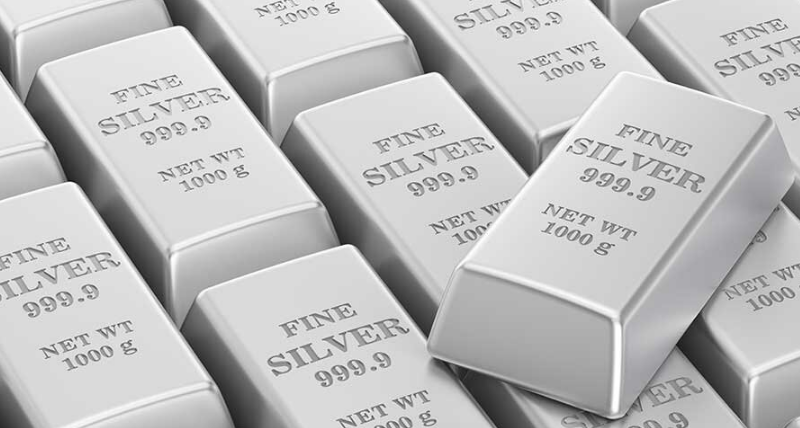Top 5 Silver ETFs
Dec 30, 2023 By Triston Martin
Although ETFs have been around since 1993, it took another 15 years before the first actively managed ETF was made available to the public.
Since then, ETFs' popularity has increased due to the fact that they are more cost-effective than traditional mutual funds. There are now a great range of exchange-traded funds (ETFs) available, with an emphasis on things like derivatives, bonds, and commodities.
Silver exchange traded funds (ETFs) are a popular investment option in the commodities market. Some exchange-traded funds, for instance, invest exclusively in silver bullion, while others invest in silver futures contracts. Others investigate the silver mining industry specifically.
Investors' use of ETFs shows signs of steady growth. Here are 5 best silver ETFs to think about if you are interested.
1. iShares Silver Trust

Investing in silver via the iShares Silver Trust (SLV) is another common practice, with SLV boasting AUM of little over $10 billion as of this writing. This trust, which has been around since April 2006 and now holds over 459 million ounces of silver, follows the LBMA Silver Price index. The fund has a larger sponsor fee than the standard in the industry, at 0.5%.
Traders looking for high liquidity may find more success with SLV, despite its higher costs. Over the last 90 days, the fund's average trading volume has been over 17 million shares, and the median bid-ask spread has been 0.05%. SLV also provides a robust options chain where investors may purchase and sell calls and puts for increased exposure or hedging purposes.
2. Aberdeen Standard Physical Silver Shares ETF
The Aberdeen Standard Physical Silver Shares Exchange Traded Fund (ETF) is also not your conventional ETF; rather, it operates similarly to the iShares Silver Trust. Investors who prefer to have physical silver in their possession will benefit from this. Aberdeen Standard Physical Silver Shares ETF aims to replicate the performance of the silver price, net of the trust's operating expenditures, through its share price.
Silver bullion for the fund is stored in a safe at the London branch of JPMorgan Chase Bank. It has been said that this ETF does a decent job of replicating the performance of the spot price of silver. It has had an annualized return of 10.7 percent over the past five years.
The net asset value of the Aberdeen Standard Physical Silver Shares ETF is based on the silver ounce price calculated by the London Bullion Market Association around noon GMT. Calculated daily at 4:00 PM New York Time by dividing London Time by the number of shares outstanding in the fund.
3. Sprott Physical Silver Trust (PSLV)

PSLV is not an exchange-traded fund by definition. A closed-end fund (CEF) is more accurate. Shares of a CEF cannot be created or redeemed after its original offering, unlike those of an ETF. Therefore, extreme buying or selling pressure may occasionally cause their share price to trade at a discount or premium to their NAV. PSLV is trading at a discount of 3.2 percent to net asset value right now.
PSLV, like the other listed ETFs and funds, allows investors to gain exposure to silver through ownership of bars held by the Royal Canadian Mint as custodian. The current amount of gold in the CEF's vaults is 171 million ounces. Those who own enough PSLV shares can even exchange them for physical silver if they so want. PSLV has a cost of 0.6% each year.
4. Global X Silver Miners ETF
The Global X Silver Miners Exchange Traded Fund (ETF) provides exposure to companies involved in the silver mining industry. The fact that such businesses stand to gain rapidly from a rising metal price is an added bonus. It is a great way for investors to diversify their holdings beyond just a few companies and spread their money around the world.
Wheaton Precious Metals (TSX:WPM,NYSE:WPM), a streaming company, makes up 22.45 percent of this ETF's weight, followed by Pan American Silver (TSX:PAAS,NASDAQ:PAAS) at 9.42 percent and First Majestic Silver (TSX:FR,NYSE:AG) at 5 percent. The expense ratio of this ETF is 0.65 percent.
5. ETFMG Prime Junior Silver ETF (SILJ)
Mining businesses are classified as either senior or junior, as indicated by the ETFMG Prime Junior Silver ETF (SILJ). Junior miners are publicly traded, low-capitalization businesses whose primary focus is the discovery and development of new silver resources. These businesses raise capital in the hopes of getting lucky and making a killing. Investment in junior miners can be as volatile as biotech stocks due to the high-risk, high-reward nature of their activities.
Investors can purchase SILJ to hedge against the potential loss of capital from the failure of a single junior miner. This ETF follows the performance of an index composed of 61 junior silver mining equities from around the world (the Prime Junior Silver Miners & Explorers Index). Again, this ETF places a significant emphasis on Canadian companies because of the country's rich mineral resources. SILJ has a low expense ratio of 0.69%.

Nov 06, 2023
Mortgages
How to Consolidate and Refinance Your Student Loans: What You Need To Know
Replacing numerous student loans, whether federal, private, or a combination of the two, with a single, fresh personal loan is known as refinancing or consolidating private student loans. If the interest rate on your new loan is lower, you'll save money. Your new interest rate will be determined by your financial history, including your credit score, income, employment, and educational background. Rates typically range from 2% to more than 9%, and you usually need a credit score of at least in the high 600s to qualify

May 18, 2024
Banking
Choosing Between TurboTenant and Cozy: What's Best for You in 2024?
If you want to compare TurboTenant vs Cozy in 2024, discover which rental management platform suits your needs best. Learn about features to make an informed decision for your property management goals.

Oct 16, 2023
Know-how
A Self-Employed 401(k) Plan
The accounts are typically established by the employer and funded by the employee. Generally, you can withdraw your 401(k) earnings tax-free after you reach the age of 59 1/2, as per IRS regulations in effect as of 20095..

May 19, 2024
Banking
Strategies for Success: 6 Effective Ways to Excel in Salary Negotiation
Read this guide to discover 6 effective tactics to approach salary negotiation with confidence and achieve the compensation you deserve.

Feb 09, 2024
Mortgages
How Do Conventional Mortgages and Loans Work
To sum up, a conventional loan is not backed by the federal government. It is instead made available and guaranteed by commercial companies. Banks, credit unions, and internet lenders are just some of the many sources for conventional loans, which are used for both home purchases and refinances

Dec 07, 2023
Know-how
Flood Insurance Unveiled: Decoding Costs and Dispelling Myths
Explore this comprehensive guide for insights on flood insurance costs and debunked myths. Navigate complexities, understand coverage nuances, and fortify your home against potential risks.

Feb 09, 2024
Investment
Should you use your IRA to pay off debt?
The content explores the ultimate answer of Should you use your IRA to pay off debt?

May 18, 2024
Banking
Your Easy Guide to Planning for Out-of-Pocket Healthcare Costs
Learn how to navigate out-of-pocket healthcare costs with ease. This article simplifies the process of planning for healthcare expenses, offering practical tips and insights.

May 18, 2024
Banking
Streamline Your Finances: 10 Easy Ways to Simplify Your Financial Life
Want to simplify your financial life? Give this article a read to check out these 10 easy-to-implement tips to streamline your finances and reduce stress.

Dec 16, 2023
Know-how
Do I Need To Repair My Car After A Claim?
There are sometimes more questions than responses in the aftermath of an automobile crash. Have you got to spend the insurance money? It can be difficult to know where to turn for useful and reliable information while dealing with insurance claims, possible injuries, plus damage to your car.

Nov 14, 2023
Banking
How to Open Your First Brokerage Account
You have made the bold move of opening a brokerage account online and are eager to get started investing. Although opening a brokerage account has a reputation for being complicated, it is actually quite straightforward. To start investing, you need learn about the many types of brokerage accounts and which features are most important to you.

Nov 26, 2023
Know-how
Is It Possible to Use One Credit Card to Pay Off Another?
Curious about paying off your credit card with another? Dive into the ins and outs, consider the factors before making a move, and learn how to manage debt with simplicity.